The Film Subjects
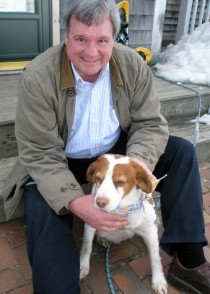
David Kiley
David Kiley is a college administrator in Massachusetts. The father of three, he met filmmaker Jean Strauss while on a cross country flight in 2007. Five weeks later, he received his original birth certificate and embarked on a journey to find answers to questions about his origins. In the two years since filming ended, he has dealt with serious health issues. His adoptive mother, who is still living, has also been critically ill. He continues to try to piece together the story of his family, and has been seeking information about his birthfather. While he has had some closure on his birthmother, he is mindful of the fact that had his record been unsealed a decade ago, he would have been enabled to know the full story of his beginnings - and his birthmother would have been able to have had her own closure, a need that is made so clear in the film she took to her grave. Tabby: When Dave met Tabby, his birthmother Isabel's Springer Spaniel, and was able to stroke Tabby's head (there is a heart shape in the center of her forhead), he later said he felt in that moment that he was touching his birthmother. He knew he was placing his hand where she had placed hers. Many people have asked if Dave brought Tabby home. His travel schedule is such that he can't have a dog, and in addition, Marylou and her husband George, were providing a wonderful home for the dog (there were three other Springer Spaniels in the family!) Tabby passed away in 2010 after a long and good life. She is buried with Isabel...
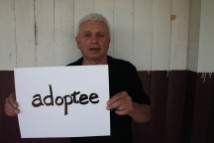
Joe DeGironimo
Joe DeGironimo: Joe grew up in New Jersey, right around the corner from the 'Soprano's house'. He is a father and grandfather, and worked for decades driving heavy earth moving machinery. He learned he was adopted at the age of 29 from a cousin, and from that moment on, wanted to know his birthmother. Had he been able to have access to his birth records in 1982, he and his birthmother would have had closure and perhaps a relationship. One of the things Joe said during the course of filming was that if his birthmother had been alive when he learned who she was, he would have invited her to live with him. Family is extremely important to Joe and to his wife Camille. He has had other visits with his sister Karen, and has met her daughter (his niece). Karen was thrilled to find out that Joe was a solo singer back in the early 60's. A 'music video' using one of his songs is on the "Other Clips" page in the "SEE" section of the website. Joe continues to advocate for access to records, not wanting to see anyone else go through 'having to find graves' the way he did.
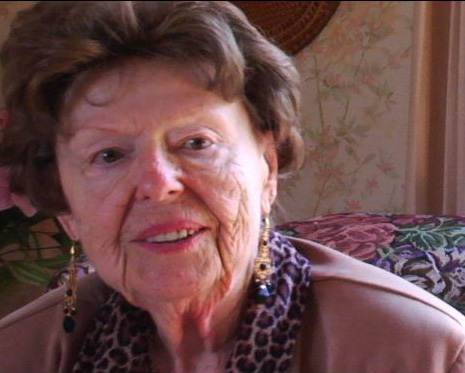
Ruth Wilson
Ruth Wilson: Ruth's original interview (filmed in 2005) appeared in "Vital Records". She was a professional woman, a highly successful realtor in southern Calfiornia. To her dying day, she just wanted to know her birthmother's name. The state of California would never release it. When the California Adoption Reform Effort supported access legislation in 2009, Ruth Wilson's daughter and granddaughter flew to Sacramento to attend the Judiciary Committee Hearing. When the bill passed unanimously, they openly wept. Ruth had been dead for just four months. The bill would later stall, and ultimately die, after a $16 million price tag was placed on its enactment. It was during the course of this legislative work that it was learned that the California Privacy Act, passed in 1977 and incorporated into the California Constitution, had a single line in it which kept Ruth from having the closure she sought: 1798.24. No agency may disclose any personal information in a manner that would link the information disclosed to the individual to whom it pertains unless the information is disclosed, as follows: (q) To an adopted person and is limited to general background information pertaining to the adopted person's natural parents, provided that the information does not include or reveal the identity of the natural parents. Ruth was adopted in 1916. This single sentence in the Constitution, imposed sixty-one years after Ruth was born, continues to effect all adopted citizens in the state.

Betty Weaver
Betty Weaver is now 90. She has long been a widow, and has one child, a daughter, Lucy, who has had lifelong health issues. Betty still wants to know who her birthmother and family were - but has for the most part given up hope of ever being able to get her own birth certificate.
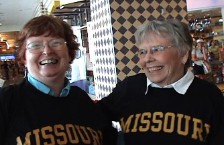
Carolyn Pooler
Carolyn Pooler and Ina Lewis: the two senior citizens from Missouri continue to try to get legislation off the ground in their home state. To date, they have encountered strong opposition from the Catholic Conference in their state, as well as from members of Bastard Nation, a group of advocates who feel that legislation that includes any compromise (in terms of protecting a birthparents privacy) is worse than no legislation. In October of 2010, Ina suffered a potentially life-threatening blood clot. This event spurred her to try one last time to get her birth record. She called to state, "I want my birth certificate. I'm tired of being treated as a child." She is taking her case to court and has retained an attorney. To be continued...
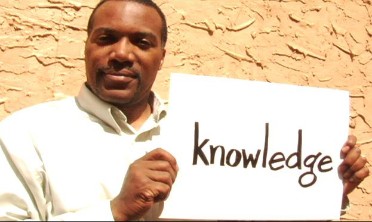
Robert O'connor
Robert O'connor: Robert continues to take xeroxes of his kids hands and thrives in his work as a college professor - and is working on his own movie...
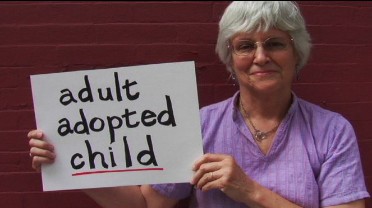
Pam Hasegawa
Pam Hasegawa: Pam is in her 32nd year of adoption reform legislation work in New Jersey (a commitment which has involved over half of her adult life). During her work to provide access to records to adopted citizens in the state where she lives (Pam herself will not benefit from the New Jersey legislation) her hair has turned white and she has become a grandmother - three times. In the historic spring of 2011, New Jersey passed reform legislation through both houses for the first time ever - only to have Governor Christie conditionally veto the bill. Discouraged, but not defeated, Pam and members of New Jersey CARE are beginning to work on the next legislative session, and to continue to find ways to educate both citizens and legislators about the need to end practices of secrecy in adoption, both prospectively and retrospectively.